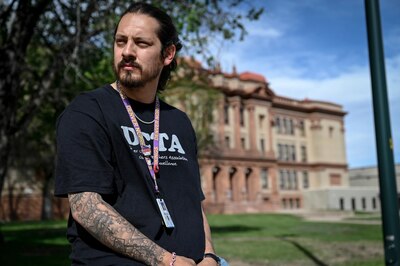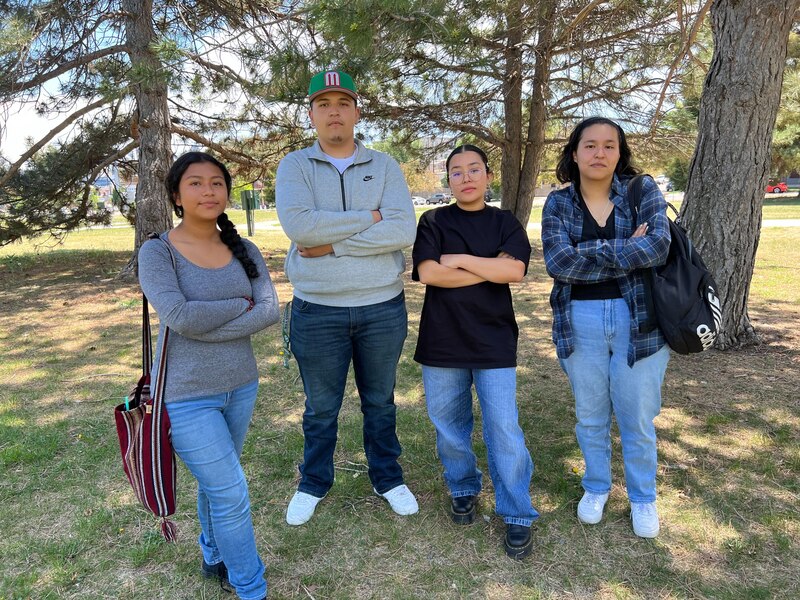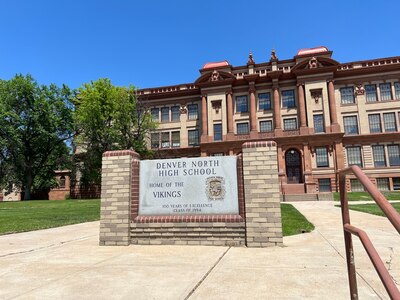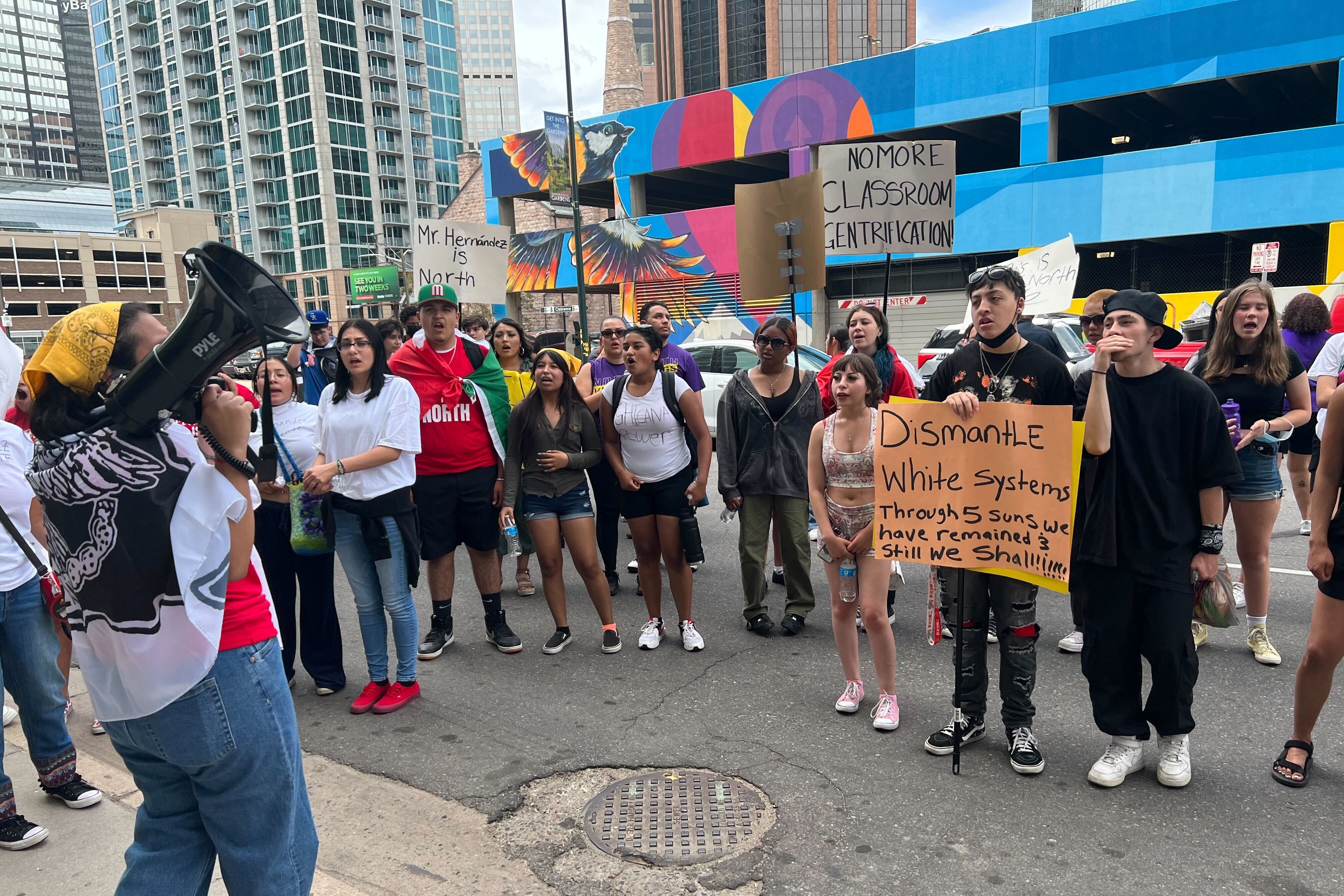North High School senior Martin Castañon grew up in a neighborhood where most people looked like him. But now, he said, white newcomers treat him with irritation, when they were the ones who “came into my neighborhood, tearing my culture away from me.”
North High’s decision not to rehire teacher Tim Hernández, who taught English, Latinx literature, and a Latinx leadership class, along with leading a student club, feels like yet another blow for the majority-Latino students at a school serving one of Denver’s most gentrified neighborhoods.
“It’s sad. It’s depressing,” Martin said. “It’s like you go from so much color and so much joy to so much depression and darkness. It sucks to get that taken away from you.”
Hernández grew up on Denver’s Northside and began teaching at North High last school year. He was hired again this school year on a one-year contract. When he applied to continue teaching at North next year, Hernández said he was not rehired.
In a statement, Denver Public Schools did not address why Hernández was not rehired. The statement said the district is committed to recruiting and retaining qualified teachers of color, and it’s up to each school’s personnel committee, which at North includes Principal Scott Wolf, to decide which teachers are hired. If the committee can’t come to consensus, the principal has the final say, according to the teacher’s union contract.

Hernández’s students said it’s been devastating to lose the teacher who taught them about the Chicano movement, Colorado student activists like Los Seis de Boulder, and the West High blowouts of 1969, when Denver students protested racism and discrimination. Hernández kept a refrigerator that students from the club stocked with free groceries. His classroom was decorated with flags and a hand-painted banner that said “casa de la cultura.”
“In the walls of our building, we know our culture is not centered anywhere else,” Hernández said of North High, “but it was in my room.”
District and state data show 75% of Denver students are students of color. But only 29% of teachers are teachers of color. Hispanic or Latino students make up 52% of the district population, but only 19% of Denver teachers are Hispanic or Latino.
“This is bigger and has always been bigger than Mr. Hernández,” said North High freshman Nayeli López, who is part of the club, called SOMOS MECHA. “The reason we talk about him so much is because he’s one of the only teachers of color at the school. Because retaining teachers of color isn’t just offering them a job, it’s making this a safe place for them.”
Over the past several weeks, North High students have held a sit-in and two walkouts to demand the school rehire Hernández. On Thursday, approximately 50 students and supporters marched to the district’s downtown headquarters, where they chanted, “Who do we want? Mr. Hernández! Where do we want him? At North High!” About 20 people signed up to talk about Hernández and North at Thursday night’s school board meeting.
At the end of the meeting, the board voted unanimously to remove Hernández from the list of teachers being “non-renewed.” Superintendent Alex Marrero said that while that doesn’t mean Hernández will be reinstated at North High, “we will support him on his journey to finding another position within DPS next year.”
Chalkbeat spoke to four students — Nayeli, Martin, senior Daniela Urbina-Valle, and junior Viridiana Sanchéz — about Hernández and the need for Denver Public Schools to hire and retain more teachers who are Black, Indigenous, and people of color. Here’s what they said.

What have your experiences been with having BIPOC teachers in school?
Martin: I’ve only had about two teachers, total, of color. … Mr. Hernández was one of the only teachers that was really true about having Brown pride. It’s kind of unfortunate that we can’t really learn about our culture through teachers. … Bringing in teachers of color would help us a lot. We can’t find out who we truly are if we don’t know where we came from.
Viridiana: Finally having a teacher that talked exactly like you did, that had a background story exactly like yours, it was eye-opening. It was so refreshing.
Nayeli: I was raised around a community where it was people from the Chicano movement and that community. That’s what I was raised in, but I never heard it in a school setting.
Daniela: Even when we do have these teachers that look like us, they are expected to conform to a system that was made by a white man. … A lot of times the white man thinks education is about control, and Mr. Hernández taught us all that that’s not true.
What did you learn in Mr. Hernández’s classes? And how did you feel?
Martin: I learned who I was. I learned what it meant to be Chicano. Coming from straight-up Mexican parents, the term Chicano isn’t really taken lightly. It’s a completely different definition from what it actually is. To them, Chicano is lazy, someone who lives off the system. That’s not what it was intended to be. Chicano is about Brown power.
The first few weeks of school, [Mr. Hernández] took us to the reunion of West [High School]. That’s not only what it was, it was a celebration from the West blowouts that happened. That was the first thing I learned about Brown people were those things from Mr. Hernández.
Nayeli: I actually met Mr. Hernández at the West High event. My dad [Denver City Clerk and former city council member Paul López] was an alumni at West High School and he had to speak there. I was the only kid who was like, “Dang, I’m from North and I’m at my rival school.”
That’s when I saw a big group of students marching in with a sign that said “From North to West, Chicano Power.” And right there, I was like, “Oh my God, how cool is that?” I’d never heard the words “Chicano power” outside of my home.
Daniela: My mom was born in Mexico and my dad was born in Nicaragua so I’m a first-generation child. … It was not normal for me to say I was Chicana because that’s wrong in their eyes. … [Hernández] taught us to be proud by showing us the history. … It’s not just Cesar Chavez. It’s not just Dolores Huerta. It’s more than just those people.
Viridiana: I met Mr. Hernández at the beginning of the year. … I remember telling him how much I hated being in AP Language because I didn’t connect with the curriculum. Everybody in the class was white. There were only three people of color, including myself, and it felt horrible. I felt very alienated in there.
He told me he taught Latinx literature and that it was so fun. … The moment I stepped in there, it felt welcoming, it felt like there was a community, and he just wanted you to be authentic.

What do you want the adults in power in Denver Public Schools to know?
Nayeli: We want our teacher back. … That’s not just a teacher to us. That’s a safe person. … Him being one of the only Northside Chicanos at North High School, that’s a big support system.
Martin: Not only do we want our teacher back, but we want more teachers who look like him, who represent their culture. We don’t want people who just look like us that don’t represent us to the fullest.
Daniela: Inclusivity and diversity isn’t LGBTQ+ History Month or Black History Month. … North thinks that they’re somehow making that an inclusive way of supporting us. But that’s in no way an inclusive way to support us.
Martin: It’s like we’re an inconvenience to them.
Nayeli: It’s like we’re written on a notepad and then tossed away.
Daniela: I know people who have said they are going to join ethnic studies classes to counselors or AP teachers and they say, “That’s not good for your transcript.’” ... I don’t think us learning and acting on where we come from is something that makes us look bad to colleges. I don’t think that’s what should be told to us by our teachers.
Viridiana: We’ve been called “troubled kids.” Or that teachers know how to handle “kids like us” because they’re worked at other schools where the majority of the population is “kids like us.”
Martin: It’s always “you people.”
Viridiana: We’ve reported it and said something, but nothing ever gets done.
Nayeli: The same kids that teachers and a lot of administrators think of as “troubled,” teachers like Mr. Hernández see us as kids who are going to get somewhere in life.
Melanie Asmar is a senior reporter for Chalkbeat Colorado, covering Denver Public Schools. Contact Melanie at masmar@chalkbeat.org.






